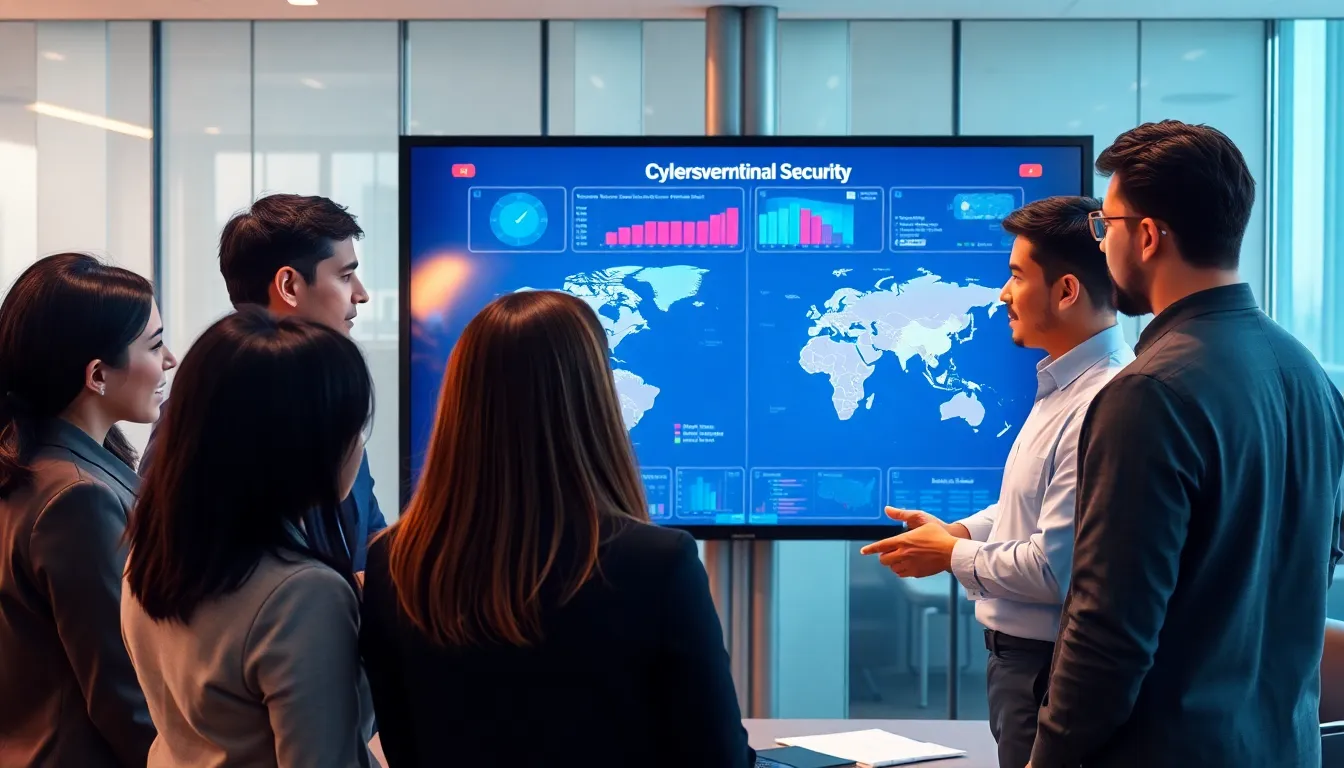In a world where the only constant is change, global security issues seem to be the one thing that keeps everyone on their toes—like a cat on a hot tin roof. From cyber threats lurking in the shadows to geopolitical tensions that could make even the most stoic diplomat sweat, the landscape of security is as unpredictable as a game of international chess played by toddlers.
Understanding these issues isn’t just for the policy wonks in stuffy suits; it’s crucial for everyone. As threats evolve, so must our awareness and strategies. Ignoring the complexities of global security is like trying to ignore a mosquito buzzing in your ear; it just won’t work. Dive into the intricacies of this vital topic and discover how it impacts not just nations, but individuals like you and me.
Table of Contents
ToggleOverview of Global Security Issues
Global security issues encompass a range of threats that challenge nations and societies. Cyber attacks represent one significant concern, with an increase in incidents targeting critical infrastructure and sensitive data. Geopolitical tensions also contribute to instability, as nations engage in conflicts over resources, ideologies, and territorial disputes.
Transnational terrorism presents another layer of complexity. Groups without borders exploit political and social discontent to perpetrate violence. Refugee crises arise from conflicts, exacerbating security challenges as displaced populations seek safety. Organized crime similarly threatens security, with drug trafficking, human smuggling, and arms deals crossing international lines.
Climate change increasingly factors into global security discussions. Natural disasters can lead to resource shortages, triggering conflict over water, food, and energy. Public health threats, including pandemics, impact social stability and strain national resources. The COVID-19 pandemic highlighted vulnerabilities in global health systems, exposing weaknesses in preparedness for widespread crises.
International cooperation is essential in addressing these issues. Multilateral organizations, like the United Nations, play a crucial role in facilitating dialogue and conflict resolution. Security strategies must adapt to the evolving threat landscape, prioritizing prevention, resilience, and effective response mechanisms.
Each of these factors highlights interconnectedness in global security dynamics. Nations cannot address these challenges in isolation. Policies must reflect an integrated approach that considers diverse security dimensions, including economic stability, human rights, and environmental sustainability. Addressing global security issues requires shared commitment and collaborative strategies to ensure peace and stability worldwide.
Major Threats to Global Security

Global security faces numerous significant threats that endanger stability worldwide. Understanding these threats is crucial for effective response strategies.
Terrorism and Extremism
Terrorism continues to pose a prominent danger with its global reach and evolving tactics. Extremist groups leverage social media for recruitment and radicalization, making counter-terrorism efforts challenging. Governments often face difficulties in solving complex issues tied to religious and political motivations. Significant incidents have revealed vulnerabilities in public safety and infrastructure. Collaborative intelligence-sharing among nations can significantly enhance preventive measures.
Cybersecurity Threats
Cybersecurity threats rank among the top concerns in today’s digital age. Cyber attacks increasingly target critical infrastructure, financial systems, and personal data. Notable breaches have demonstrated how vulnerable organizations and governments are to sophisticated attacks. Such incidents can disrupt economies and compromise national security. A robust cybersecurity framework, including regular assessments and the adoption of advanced technologies, is essential for strengthening defenses. Ongoing training and awareness campaigns can further prepare individuals and organizations to recognize potential threats.
Climate Change and Environmental Challenges
Climate change presents urgent and far-reaching security implications. Natural disasters stemming from climate events disrupt economies and displace populations. Resource scarcity related to water, food, and energy heightens geopolitical tensions. Vulnerable regions suffer more profoundly, which may lead to increased conflict and migration. Multilateral strategies focusing on sustainability not only address environmental concerns but also foster cooperation among nations. Building resilience at local to global levels is critical for mitigating future conflicts driven by climate-related challenges.
Regional Security Concerns
Regional security concerns significantly impact global stability, with varying challenges emerging across different areas.
Middle East Conflicts
Conflicts in the Middle East threaten regional and global security. Competition for resources fuels tensions among nations, particularly over water and energy supplies. The Syrian civil war exemplifies ongoing instability, resulting in humanitarian crises that extend beyond borders. Additionally, the rise of extremist groups complicates peace efforts, leading to transnational terrorism. Diplomatic initiatives face difficulties in establishing lasting resolutions. Increased arms sales exacerbate conflicts, with both state and non-state actors involved in violent confrontations. Navigating these complexities demands concerted efforts from international coalitions dedicated to fostering stability.
Asia-Pacific Tensions
Tensions in the Asia-Pacific region primarily revolve around territorial disputes. The South China Sea stands out due to competing claims by multiple countries, prompting military buildups. North Korea’s unpredictable behavior poses significant security threats, actively involving nuclear weapons development. Alliances among nations in the region, such as the U.S., Japan, and Australia, focus on ensuring security through collaboration. Cybersecurity issues also arise, with state-sponsored attacks targeting critical infrastructure. This multifaceted environment requires proactive strategies that balance diplomatic dialogue and military readiness to address emerging challenges.
European Security Issues
European security issues originate from various sources, including rising nationalism and migration crises. The Russian invasion of Ukraine highlights direct military aggression, destabilizing the region and raising fears of broader conflict. NATO’s role has become critical in coordinating defense initiatives among member states facing potential threats. Cybersecurity is a growing concern, with attacks targeting governmental and financial institutions. Additionally, internal divisions within the European Union complicate cooperative security measures. Addressing these challenges mandates comprehensive strategies promoting unity and resilience across Europe.
International Efforts and Frameworks
International cooperation is vital in addressing global security issues. Various organizations and frameworks facilitate negotiations and collective action among countries.
United Nations and Global Governance
The United Nations (UN) plays a central role in global governance. Through its Security Council, the UN addresses threats to peace and security, facilitating resolutions and peacekeeping missions. Member states participate in discussions to promote diplomacy and conflict resolution. Moreover, initiatives like the UN Sustainable Development Goals (SDGs) aim to address root causes of instability, including poverty and inequality. Partnerships between UN agencies and regional organizations enhance the capacity to respond to crises. This collaborative approach provides a framework for nations to address interconnected challenges effectively.
NATO and Collective Defense
NATO, or the North Atlantic Treaty Organization, exemplifies a collective defense strategy. Established in 1949, NATO unites member countries to ensure mutual defense against external threats. Article 5 of the NATO treaty underscores this commitment, stating that an attack against one member is an attack against all. Regular military exercises enhance readiness and interoperability among allied forces. The organization also adapts to new security challenges, including cyber threats and terrorism. As a political and military alliance, NATO facilitates cooperation among its members to safeguard shared values and collective security.
Future of Global Security
Global security faces a dynamic future shaped by innovation and interdependence. Emerging threats and rapid technological advancements impact security strategies.
Emerging Technologies and Warfare
Artificial intelligence transforms the battlefield, enhancing decision-making and operational efficiency. Drones enable precise strikes, while cybersecurity protects critical systems from malicious attacks. Advanced surveillance tools help monitor threats at an unprecedented level. Quantum computing presents both risks and opportunities for encryption methods, potentially changing the landscape of information security. Blockchain technology secures data integrity, but its adoption also introduces new vulnerabilities. Nations that harness these technologies effectively can gain strategic advantages.
The Role of Global Cooperation
International collaboration is essential for addressing complex security challenges. Multilateral agreements unite countries to combat terrorism, cybercrime, and pandemics. Organizations like the United Nations facilitate diplomatic dialogue and peacekeeping missions. Emergency responses rely on partnerships between nations to tackle humanitarian crises. Regional alliances, such as NATO, enhance collective defense and resilience against evolving threats. Cooperation across borders strengthens efforts to mitigate climate change’s impact on security. The future depends on shared knowledge and coordinated action in overcoming global challenges.
Global security issues demand attention and proactive engagement from all levels of society. As threats evolve and become more interconnected, understanding their implications is crucial for fostering resilience and stability. The complexities of cybersecurity, geopolitical tensions, and climate change require collaborative solutions that prioritize prevention and adaptability.
International cooperation remains vital in addressing these multifaceted challenges. By leveraging frameworks like the United Nations and fostering partnerships, nations can work together to promote peace and security. The future hinges on shared knowledge and coordinated efforts, ensuring that global communities are equipped to navigate the uncertainties ahead.







